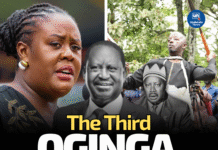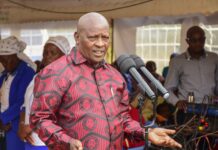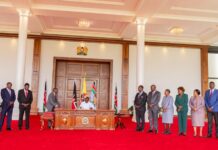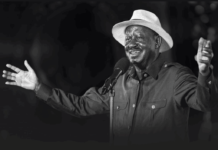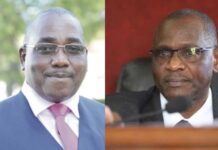The end of the six-year term of Independent Electoral and Boundaries Commission (IEBC) chairperson Wafula Chebukati and two other commissioners brings to a close a turbulent chapter in which four commissioners resigned and three of their replacements followed suit.
Mr. Chebukati and commissioners Abdi Guliye and Boya Molu’s terms expire on January 17, 2023, six years after a seven-member team was sworn in.
Chebukati was appointed head of the IEBC on January 18, 2017, following his nomination a month earlier.
Mr Chebukati and six other new commissioners succeeded Mr Ahmed Issack Hassan and his team.
Vice chairperson Connie Nkatha Maina, as well as commissioners Roselyne Akombe, Paul Kurgat, and Margaret Mwachanya—all of whom were sworn in alongside the other three—resigned after the 2017 General Election, shrouded in secrecy and fear of a commission split down the middle.
In 2017, the Supreme Court nullified President Uhuru Kenyatta’s re-election and ordered a fresh presidential poll; two judges dissented while four upheld Raila’s petition.
CJ David Maraga said the IEBC committed various illegalities affecting the integrity of the polls.
The six-judge bench upheld a petition filed by NASA Presidential candidate Raila Odinga and his running mate Stephen Kalonzo Musyoka on August 18, 2017.
But in early October, Raila quit the repeat presidential election saying it won’t be free and fair.
As a result, Uhuru was declared the president.
However, the by-elections this week in Kandara, Garissa Township, Elgeyo Marakwet, and Lamu’s Shella ward may have been the three’s final major assignment.
Three of the four IEBC commissioners who took over for the four who left—Juliana Cherera, Francis Wanderi, and Justus Nyang’aya—resigned last month to avoid facing the tribunal led by Justice Aggrey Muchelule, which was investigating their conduct. Irene Masit, the remaining commissioner, has chosen to appear before the tribunal.
The departures of Mr. Chebukati, Mr. Molu, and Prof Guliye are likely to have an impact on the boundary review process, which is scheduled to wrap up next year. The collection of public input is expected to begin this year.
Ms. Masit’s situation is complicated by the fact that she is awaiting the verdict of the tribunal. As a result, the electoral commission will not be legally formed by January 18.
The four commissioners, led by then Vice Chairperson Juliana Cherera, Justus Nyang’aya, Irene Masit and Francis Wanderi rejected the results announced by Chebukati on grounds that the final tally was “opaque”.
For Mr. Chebukati, Prof Guliye, and Mr. Molu, their exit can be described as a bittersweet exit, with their actions having attracted praise and criticism in equal measure.
According to Mr Chebukati, the August General Election – “which was very peaceful” – demonstrated that democracy in Kenya has come of age.
The IEBC chairman, however, said three areas need improvement for foolproof elections.
He cited legal reforms, especially touching on electoral management laws; improvement of technology in results transmission and enhancing funding.
This comes after the Azimio la Umoja – One Kenya coalition leader Raila Odinga insisted that his victory was stolen in the August presidential election and IEBC Chairman Wafula Chebukati should be held accountable for allegedly bungling the poll.
The ODM party leader said Chebukati should be prosecuted for allegedly overseeing electoral fraud and jailed for the same.
The former prime minister said the offences committed by Chebukati amounted to crimes against humanity.
The ODM leader said the IEBC chair should stand trial at the International Criminal Court (ICC) in the Hague for crimes that saw him lose the 2022 state house race.
“In my view, Mr. Chebukati is a criminal who should be prosecuted and sentenced to jail. What he has committed is a great crime against humanity and against the people of this country. I strongly believe he, not the other four commissioners, should be in the dock… if it is not done there will be no need for Kenyans in 2027 to go to the polls,” Raila said.
Raila also faulted the Supreme Court for dismissing his petition challenging the election of William Ruto as Kenya’s fifth President, saying the ruling was a big blow to the country’s democratic space.
“It is a tragedy of justice and it was an even bigger tragedy when the Supreme Court confirmed that blatant kind of rigging of elections,” the ODM boss said.
“I am not bitter because the elections are not for Raila Odinga, it is for Kenyans. We want an audit of these results so that Kenyans can have confidence come 2027 that they can go to the polls, cast their votes and that their votes will count,” he added.
But for President William Ruto, Mr Chebukati is a hero for refusing to “accept blackmail and bribery”.
“That we can resist bribery, blackmail and intimidation and serve the public interest as public servants, I want to say Chebukati is the hero of this election,” he said recently.
Mr. Chebukati has since been awarded the Elder of the Order of the Golden Heart (EGH) while commissioners Molu and Guliye have been awarded Elder of the Order of the Burning Spear (EBS).










